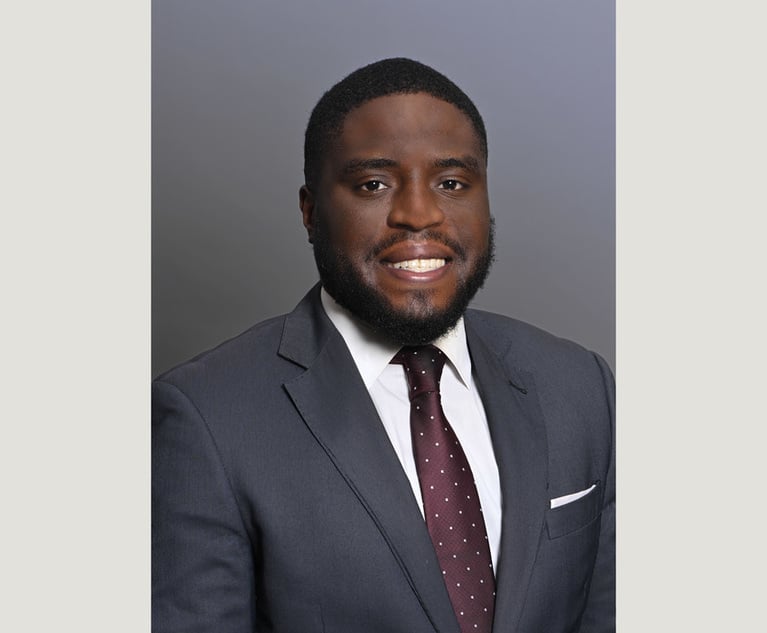The Challenge of Making Trademarks Match Changing Social Views
There has been much in the general and legal news about the challenge to the NFL Washington Redskins trademark registrations. Recently, a federal district court judge affirmed the decision of the U.S. Patent and Trademark Office (USPTO) Trademark Trial and Appeal Board (TTAB) to cancel the Washington Redskins' trademarks as disparaging to Native Americans.
September 01, 2015 at 08:03 PM
8 minute read
There has been much in the general and legal news about the challenge to the NFL Washington Redskins trademark registrations. Recently, a federal district court judge affirmed the decision of the U.S. Patent and Trademark Office (USPTO) Trademark Trial and Appeal Board (TTAB) to cancel the Washington Redskins' trademarks as disparaging to Native Americans. In the much publicized case of Blackhorse v. Pro-Football, 111 USPQ2d 1080 (TTAB 2014), the Washington team and the National Football League faced a public relations problem. In this most recent TTAB decision, one in the series of actions against the Redskins, a group composed of representatives from five Native American tribes succeeded in convincing the TTAB that Native Americans find the Washington NFL team's “Redskins” marks to be disparaging of them. While the NFL connection and the fame of the football team have drawn much attention to this case, the issue is larger than one case or one series of trademarks. The larger issue is whether there will be a new policy of trademark policing or a new recognition that there may have been mistakes made in some registrations because the majority of the public did not find the mark offensive.
Individuals on one side of this issue find it unsettling that an offended group is permitted to challenge existing, registered marks that have been in use for more than four decades as personally offensive and successfully strip away the trademark registration. Individuals on the other side of this issue find it unsettling that an organization was ever permitted to register the marks or that they were ever considered for use. What this conflict demonstrates is the evolving social value that is now in play when the USPTO trademark attorney reviews a new application or a challenge to an existing registration, or the TTAB reviews either decision. In other words, a trademark will not get a pass: because it is already registered; because it may apply to an individual who is a member of the disparaged class; or because the majority of the population does not find it offensive.
The Lanham Act, 15 U.S.C. Section 1051 et seq., and Section 2(a) of the act, are not biased in either direction. A mark will be found disparaging under Section 2(a) if its likely meaning is found to be disparaging to a substantial composite of a referenced group of identifiable people, institutions, beliefs or national symbols. Standing to bring a trademark cancelation proceeding requires minimal evidence that the individual or group filing the claim was reasonably and actually offended by the mark. As such, it appears that the Lanham Act was designed to protect groups, such as the petitioners who sought cancellation of the Redskins marks, from experiencing the alleged personal or group disparagement. The other side of this particular cancellation challenge believes that the Lanham Act should not allow a late challenge to organizational trademarks that were adopted and used in good faith, had been granted registrations, and acquired a secondary, nondisparaging meaning over decades of use. It was a point of contention in the Blackhorse case as to whether the marks could acquire a nondisparaging meaning. Nevertheless, the TTAB and the district court found the marks to be disparaging to a substantial composite of Native Americans and canceled the marks.
This content has been archived. It is available through our partners, LexisNexis® and Bloomberg Law.
To view this content, please continue to their sites.
Not a Lexis Subscriber?
Subscribe Now
Not a Bloomberg Law Subscriber?
Subscribe Now
NOT FOR REPRINT
© 2025 ALM Global, LLC, All Rights Reserved. Request academic re-use from www.copyright.com. All other uses, submit a request to [email protected]. For more information visit Asset & Logo Licensing.
You Might Like
View All
'Taking the Best' of Both Firms, Ballard Spahr and Lane Powell Officially Merge
6 minute read

Trending Stories
- 1South Florida Attorney Charged With Aggravated Battery After Incident in Prime Rib Line
- 2'A Death Sentence for TikTok'?: Litigators and Experts Weigh Impact of Potential Ban on Creators and Data Privacy
- 3Bribery Case Against Former Lt. Gov. Brian Benjamin Is Dropped
- 4‘Extremely Disturbing’: AI Firms Face Class Action by ‘Taskers’ Exposed to Traumatic Content
- 5State Appeals Court Revives BraunHagey Lawsuit Alleging $4.2M Unlawful Wire to China
Who Got The Work
J. Brugh Lower of Gibbons has entered an appearance for industrial equipment supplier Devco Corporation in a pending trademark infringement lawsuit. The suit, accusing the defendant of selling knock-off Graco products, was filed Dec. 18 in New Jersey District Court by Rivkin Radler on behalf of Graco Inc. and Graco Minnesota. The case, assigned to U.S. District Judge Zahid N. Quraishi, is 3:24-cv-11294, Graco Inc. et al v. Devco Corporation.
Who Got The Work
Rebecca Maller-Stein and Kent A. Yalowitz of Arnold & Porter Kaye Scholer have entered their appearances for Hanaco Venture Capital and its executives, Lior Prosor and David Frankel, in a pending securities lawsuit. The action, filed on Dec. 24 in New York Southern District Court by Zell, Aron & Co. on behalf of Goldeneye Advisors, accuses the defendants of negligently and fraudulently managing the plaintiff's $1 million investment. The case, assigned to U.S. District Judge Vernon S. Broderick, is 1:24-cv-09918, Goldeneye Advisors, LLC v. Hanaco Venture Capital, Ltd. et al.
Who Got The Work
Attorneys from A&O Shearman has stepped in as defense counsel for Toronto-Dominion Bank and other defendants in a pending securities class action. The suit, filed Dec. 11 in New York Southern District Court by Bleichmar Fonti & Auld, accuses the defendants of concealing the bank's 'pervasive' deficiencies in regards to its compliance with the Bank Secrecy Act and the quality of its anti-money laundering controls. The case, assigned to U.S. District Judge Arun Subramanian, is 1:24-cv-09445, Gonzalez v. The Toronto-Dominion Bank et al.
Who Got The Work
Crown Castle International, a Pennsylvania company providing shared communications infrastructure, has turned to Luke D. Wolf of Gordon Rees Scully Mansukhani to fend off a pending breach-of-contract lawsuit. The court action, filed Nov. 25 in Michigan Eastern District Court by Hooper Hathaway PC on behalf of The Town Residences LLC, accuses Crown Castle of failing to transfer approximately $30,000 in utility payments from T-Mobile in breach of a roof-top lease and assignment agreement. The case, assigned to U.S. District Judge Susan K. Declercq, is 2:24-cv-13131, The Town Residences LLC v. T-Mobile US, Inc. et al.
Who Got The Work
Wilfred P. Coronato and Daniel M. Schwartz of McCarter & English have stepped in as defense counsel to Electrolux Home Products Inc. in a pending product liability lawsuit. The court action, filed Nov. 26 in New York Eastern District Court by Poulos Lopiccolo PC and Nagel Rice LLP on behalf of David Stern, alleges that the defendant's refrigerators’ drawers and shelving repeatedly break and fall apart within months after purchase. The case, assigned to U.S. District Judge Joan M. Azrack, is 2:24-cv-08204, Stern v. Electrolux Home Products, Inc.
Featured Firms
Law Offices of Gary Martin Hays & Associates, P.C.
(470) 294-1674
Law Offices of Mark E. Salomone
(857) 444-6468
Smith & Hassler
(713) 739-1250






